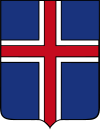Icelandic outvasion
The Icelandic "outvasion" (Icelandic: útrás [ˈuːtraus]) was the period in the economic history of Iceland between 2000 and the onset of its financial crisis in October 2008. With the privatisation of the Icelandic banks being advantageous for investors, there was a large supply of cheap loan capital on the international market. A clause in the agreement with the European Economic Area stipulated the free flow of capital to and from Iceland.
The so-called outvasion entailed Icelandic financiers (sometimes styled útrásarvíkingar, 'outvasion vikings') to purchase many foreign businesses, particularly in the retail sector. The British retailers Debenhams, Woolworths, Hamleys, and others came into full or part-Icelandic possession, in addition to the Danish companies Magasin du Nord and Royal Unibrew. Novator Partners acquired telecoms and other assets around Europe, including České Radiokomunikace, Elisa, Saunalahti, Bulgarian Telecommunications Company, P4 Spółka z o.o., Netia, and Forthnet.
Terminology
The English term outvasion was coined by the Icelandic media as a calque on the Icelandic term útrás. Út means 'out'; rás, in this context, means 'a rush, race, sprint, expansion'; and útrás correspondingly means outward rush.[1]
Investigations
In 2005 a group of Danish journalists found that Thor Björgólfsson, his father Björgólfur Guðmundsson and friend Magnús Þorsteinsson all have background in Russia, where they ran beverage businesses in the 1990s before moving to Iceland. They provided details about their activities in Russia.[2][3] Icelandic links to Russia were also highlighted by The Guardian newspaper article "Next-generation Viking invasion - They've got the cash to buy big UK groups like M&S. But where does it come from?" in 2005.[4]
Furthermore, investigations have identified six British Virgin Islands-based shareholders behind Icelandic banks and companies such as Glitnir, Landsbanki (and its Internet brand Icesave), Kaupthing, Baugur Group and Exista: Starbook International Limited, Waverton Group Limited, Birefield Holdings Limited, Shapburg Limited, Quenon Investments Limited, and Liftwood Investments Limited.[5] All six are registered in P.O. Box 3186 Road Town, Tortola, British Virgin Islands.
Documents available on Luxembourg authorities' website and discovered by Danish journalists show that Shapburg Limited and Quenon Investment Limited owned a stake in Luxembourg-based Alrosa Finance, a subsidiary of Russian state-owned diamond company ALROSA.[2] Shapburg Limited also owned a stake in Luxembourg-based Alfa Finance Holdings, a subsidiary of Alfa-Bank of Russia.[2]
References
- ↑ Eirikur Bergmann, Iceland and the International Financial Crisis: Boom, Bust and Recovery (Basingstoke: Palgrave Macmillan, 2014), p. 6.
- 1 2 3 "Россия желает спасать Исландию из-за давних офшорных связей чиновников и бизнесменов". The New Times. 2008-10-21.
- ↑ "Зачем Россия спасает Исландию". Rususa. 2008-10-21. Archived from the original on 2011-07-15.
- ↑ Griffiths, Ian (2005-06-16). "Next-generation Viking invasion - They've got the cash to buy big UK groups like M&S. But where does it come from?". London: The Guardian.
- ↑ "Íslenskt félaganet og faldir eigendur". TÍUND FRÉTTABLAÐ RSK MARS 2009.
